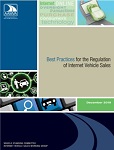Since the inception of the internet, consumers have continually become more aware of the ease of making online purchases, which has led society to push for the availability of more and more products online and savvy businesses are only too happy to satisfy that desire. One of the areas that is seeing a marked increase in online transactions is the auto industry. Consumers are clamoring for the opportunity to purchase the vehicles of their choice online because it expands the options available and enables them to save a considerable amount of time and possibly money over traditional vehicle-buying methods. The internet offers a means for private sellers and licensed dealers to expand their market area. It also offers the ability for licensed motor vehicle dealers to better position themselves to meet consumer demands in an everchanging and evolving environment.
As internet vehicle sales increase, jurisdictions grapple with the most effective approach to protect and educate consumers and auto industry members who use technology to buy and sell vehicles online. Although the internet may ease the buying process, expand the choices for buyers, and increase the market for sellers, the internet can also be a conduit for fraudulent activity. In many jurisdictions, the lack of laws and rules directly aimed at internet vehicle sales enables those intent on cheating others to more easily avoid government oversight and make money at the expense of the buying public.
As we enter the third decade of internet vehicle sales, the variety of options for purchasing and selling vehicles online continues to expand. Individual dealers, groups of dealers, and some manufacturers advertise, finance, hold virtual auctions, and sell vehicles online. A wide variety of new vehicle sales business models are emerging, and even more are likely in the future.
Consumers are learning about new and used vehicles for sale through online searches and are armed with more knowledge when they walk into a dealership than ever before. Informed consumers know what they want for a vehicle, how much they want to pay for it, and how they are going to finance it. They are familiar with the different vehicle makes, models, and option packages. Because they have done this research, they expect an efficient transaction and expect to spend less time in the dealership. Consumers may not be aware that while they know which vehicle they want to buy, they may not be familiar with how the new technology in the vehicle works, and they should plan to spend some time at the dealership learning about it so they can safely drive the vehicle off the lot.
All of this has led to jurisdictions asking AAMVA to provide guidance to help them adapt to evolving online vehicle sales. It is for this reason that the AAMVA Internet Vehicle Sales Working Group was established to develop this document for a targeted audience—the agencies that administer and enforce dealer licensing.
 Download
Download
As internet vehicle sales increase, jurisdictions grapple with the most effective approach to protect and educate consumers and auto industry members who use technology to buy and sell vehicles online. Although the internet may ease the buying process, expand the choices for buyers, and increase the market for sellers, the internet can also be a conduit for fraudulent activity. In many jurisdictions, the lack of laws and rules directly aimed at internet vehicle sales enables those intent on cheating others to more easily avoid government oversight and make money at the expense of the buying public.
As we enter the third decade of internet vehicle sales, the variety of options for purchasing and selling vehicles online continues to expand. Individual dealers, groups of dealers, and some manufacturers advertise, finance, hold virtual auctions, and sell vehicles online. A wide variety of new vehicle sales business models are emerging, and even more are likely in the future.
Consumers are learning about new and used vehicles for sale through online searches and are armed with more knowledge when they walk into a dealership than ever before. Informed consumers know what they want for a vehicle, how much they want to pay for it, and how they are going to finance it. They are familiar with the different vehicle makes, models, and option packages. Because they have done this research, they expect an efficient transaction and expect to spend less time in the dealership. Consumers may not be aware that while they know which vehicle they want to buy, they may not be familiar with how the new technology in the vehicle works, and they should plan to spend some time at the dealership learning about it so they can safely drive the vehicle off the lot.
All of this has led to jurisdictions asking AAMVA to provide guidance to help them adapt to evolving online vehicle sales. It is for this reason that the AAMVA Internet Vehicle Sales Working Group was established to develop this document for a targeted audience—the agencies that administer and enforce dealer licensing.
